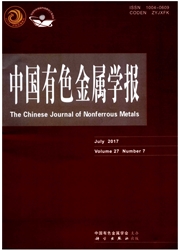

 中文摘要:
中文摘要:
在含有蛇纹石的矿石浮选过程中,蛇纹石易泥化并吸附于其他矿物表面,从而降低其他有用矿物的可浮性,恶化浮选环境。在硼镁石浮选过程中,蛇纹石可对硼镁石回收率产生较大影响。通过DLVO理论,对蛇纹石、硼镁石在矿浆中团聚吸附本质及其相互作用机理进行深入探讨。结果表明:矿物颗粒粒度及pH值都能对颗粒间作用行为产生影响,但是后者才是主要影响因素,其本质是pH值改变矿物颗粒表面荷电状态。不同pH值条件下,颗粒间表现出不同的作用行为。pH值为9.0时,蛇纹石与硼镁石颗粒间、蛇纹石颗粒间及硼镁石颗粒间相互吸引,易产生团聚现象。当pH值为11.0时,颗粒状态随颗粒间距离而变化,颗粒间距离为2.5~12.5 nm时,呈现出分散状态;当颗粒间距离小于2.5 nm或大于12.5 nm时颗粒间相互团聚。
 英文摘要:
英文摘要:
During the flotation process with serpentine in the pulp, serpentine is prone to form slime and absorb to the surface of other minerals, leading to decrease of floatability of target minerals. In the process of ascharite flotation, serpentine has significant influence on ascharite recovery. The aggregation and dispersion phenomenon in the pulp, and the mechanism of particles interaction between serpentine and ascharite were investigated based on DLVO theory. The results show that both particle size and pH value of pulp can influence the particles interaction behavior, and the latter is the main influence factor. The basic reason is that the surface charges can be changed by pH values. In different pH value, particles assume different flotation behaviors. At pH of 9.0, aggregation occurs in the same particles of serpentine and ascharite particles, and it also happens between serpentine and ascharite particles; at pH of 11.0, particles interaction is extremely complicated, particles interaction behaviors vary with particles distance. Dispersion occurs while the ascharite particle distance between 2.5 and 12.5 nm. However, while the particle distance of less than 2.5 nm or larger than 12.5 rim, agglomeration is dominated.
 同期刊论文项目
同期刊论文项目
 同项目期刊论文
同项目期刊论文
 期刊信息
期刊信息
